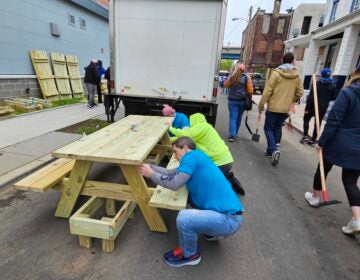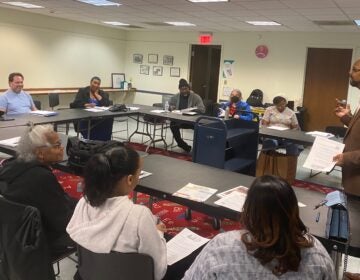After the music ends, what’s a musician to do?
There’s a whole class of people who don’t get to call themselves artists of any kind when they file their taxes every year.

A kit of drums and a microphones on an empty stage in blue smoke before the concert
Philadelphia favorite son and Grammy Award-winner Questlove has published “Creative Quest,” a collection of inspirational stories and lessons about living one’s best creative life. In this spirit, Speak Easy has asked Philadelphia artists to share stories of their own creative quests.
The final tour I went on as a musician was pretty typical, a few stages and even more basements across a stretch of the eastern half of the United States. We were making our way back east from Chicago (you don’t tour further west unless you want to do the entire U.S.) when we parked at a truck stop on the Ohio Turnpike for some food.
The four of us, reeking from sleeping on floors because we wanted to avoid the extravagance of a motel room, were standing in line at a McDonalds. Red-eyed and exhausted, with hours to go before we finally made it to Pittsburgh, a middle-aged man in a T-shirt and leather jacket approached us.
“You guys look like a band,” he said.
I don’t remember exactly how we responded, but, we were so tired, it probably wasn’t anything more than a “cool … thanks.”
He then explained, in a folksy Midwestern accent, that he was the original bassist of the legendary Cleveland punk band Dead Boys. We were talking to Jeff Mangum. He played on “Young, Loud, and Snotty.” This man, by all means, should be a legend. My friends and I were gawking, unable to process how weird and unexpected this encounter was. Then I made the illusion-shattering mistake of asking: “What do you do now?”
“Ah, I run a food truck now” he explained. Jeff and his son (he had a son?) would follow Phish from tour stop to tour stop and sell food to people tailgating before each concert.
“I make a way better living running the food truck than I ever did actually playing,” he said.
He wished us good luck, got his order, and laughed as he disappeared into the flat Ohio horizon.
I don’t think I said anything to my bandmates as I ate my cheeseburgers.
I bring this up, because I still think about how comically unjust that image felt to me. Jeff Mangum, punk hero and the pride of working-class parents in Cleveland, gives up the dream of performing to flip burgers outside a Phish show. I would work myself into a frenzy as I romanticized the risks that Mangum took in the ’70s, relocating to New York City with Dead Boys, where they could have easily disappeared into obscurity.
Contrast that with Phish, a jam band formed at the University of Vermont and fronted by the son of an executive vice president. Thinking about Jeff (“Mr. Mangum” in my mind) having to serve the hordes of wooks” (Phish fans) for the crime of being part of an uncompromisingly confrontational band never failed to enrage me. There’s no justice in this world, might as well quit.
Now, years removed from this encounter, it starts to make more sense why I was more upset by Jeff Mangum’s fate than Jeff Mangum was. For too long, I hoped the art world would somehow rectify the injustices of the real world. This was frankly an insane thing to expect.
I wanted culture to exist as a level playing field when it very clearly was not and never will be.
The sons and daughters of lawyers and professors will always have better gear than your ilk. They won’t be as burdened by demeaning wage jobs. They can take a few years off to slum it with you and your friends, and, quite frankly, they’re probably going to have more time to write better songs than you.
But every second spent thinking about this is a wasted moment. To be able to call oneself an artist or musician or actor at any point in your life is an utter privilege. It means you’ve been afforded days to contemplate and create in a way that the daily grind of living doesn’t afford most people. You had an audience, no matter how modest.
In the last year, I switched from playing music to doing comedy, and I’m trying to shake off the old narratives and bitterness I was hanging onto after leaving the touring life behind.
I like asking to be introduced as an “administrative assistant” (my “real” job) at shows. Usually it gets a laugh and reminds me I still get to do something as special as performing, even if not for a living. There’s a whole class of people who don’t get to call themselves artists of any kind when they file their taxes every year.
My favorite songwriters are landscapers and retail clerks. My favorite comics are brewers and auto mechanics. I typically get fliers for events made by a movie theater manager. Yes, being an artist can come down to class as much as talent or sincerity, but making art has consistently been the best way for me to encounter people I would have never known otherwise.
That’s a reward that lasts a long time, even if you grow old enough to open up a food truck.
WHYY is your source for fact-based, in-depth journalism and information. As a nonprofit organization, we rely on financial support from readers like you. Please give today.




